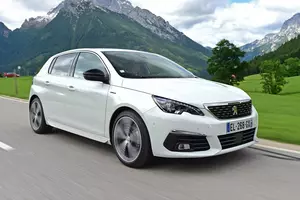
| Vehicle | Precise engine size | Difference from world average | Engine size to consumption ratio | Horsepower from 1 L | Engine size to 100 kg of weight |
|---|---|---|---|---|---|
| 1.2 PureTech |
1.2 L (1199 cc) |
48.9% smaller | 27 cc to 1 mpg | 108 hp from 1 L | - |
| GT 1.6 THP |
1.6 L (1598 cc) |
31.9% smaller | 38 cc to 1 mpg | 128 hp from 1 L | 133 cc to 100 kg |
| 1.6 BlueHDi |
1.56 L (1560 cc) |
33.5% smaller | 21 cc to 1 mpg | 77 hp from 1 L | 130 cc to 100 kg |
| 2.0 BlueHDi |
2 L (1997 cc) |
14.9% smaller | 38 cc to 1 mpg | 89 hp from 1 L | - |
| GT 2.0 BlueHDi |
2 L (1997 cc) |
14.9% smaller | 38 cc to 1 mpg | 90 hp from 1 L | 154 cc to 100 kg |
| GTi 1.6 THP |
1.6 L (1598 cc) |
31.9% smaller | 41 cc to 1 mpg | 169 hp from 1 L | 133 cc to 100 kg |
| 1.5 BlueHDi |
1.5 L (1499 cc) |
36.1% smaller | 24 cc to 1 mpg | 87 hp from 1 L | 125 cc to 100 kg |
| 1.6 PureTech |
1.6 L (1598 cc) |
31.9% smaller | 39 cc to 1 mpg | 141 hp from 1 L | - |
| GTi 1.6 PureTech |
1.6 L (1598 cc) |
31.9% smaller | 44 cc to 1 mpg | 164 hp from 1 L | 114 cc to 100 kg |
| Vehicle | 1.2 PureTech |
|---|---|
| Precise engine size | 1.2 L (1199 cc) |
| Difference from world average | 48.9 smaller |
| Engine size to consumption ratio | 27 cc to 1 mpg |
| Horsepower from 1 L | 108 hp from 1 L |
| Engine size to 100 kg of weight | - |
| Vehicle | GT 1.6 THP |
| Precise engine size | 1.6 L (1598 cc) |
| Difference from world average | 31.9 smaller |
| Engine size to consumption ratio | 38 cc to 1 mpg |
| Horsepower from 1 L | 128 hp from 1 L |
| Engine size to 100 kg of weight | 133 cc to 100 kg |
| Vehicle | 1.6 BlueHDi |
| Precise engine size | 1.56 L (1560 cc) |
| Difference from world average | 33.5 smaller |
| Engine size to consumption ratio | 21 cc to 1 mpg |
| Horsepower from 1 L | 77 hp from 1 L |
| Engine size to 100 kg of weight | 130 cc to 100 kg |
| Vehicle | 2.0 BlueHDi |
| Precise engine size | 2 L (1997 cc) |
| Difference from world average | 14.9 smaller |
| Engine size to consumption ratio | 38 cc to 1 mpg |
| Horsepower from 1 L | 89 hp from 1 L |
| Engine size to 100 kg of weight | - |
| Vehicle | GT 2.0 BlueHDi |
| Precise engine size | 2 L (1997 cc) |
| Difference from world average | 14.9 smaller |
| Engine size to consumption ratio | 38 cc to 1 mpg |
| Horsepower from 1 L | 90 hp from 1 L |
| Engine size to 100 kg of weight | 154 cc to 100 kg |
| Vehicle | GTi 1.6 THP |
| Precise engine size | 1.6 L (1598 cc) |
| Difference from world average | 31.9 smaller |
| Engine size to consumption ratio | 41 cc to 1 mpg |
| Horsepower from 1 L | 169 hp from 1 L |
| Engine size to 100 kg of weight | 133 cc to 100 kg |
| Vehicle | 1.5 BlueHDi |
| Precise engine size | 1.5 L (1499 cc) |
| Difference from world average | 36.1 smaller |
| Engine size to consumption ratio | 24 cc to 1 mpg |
| Horsepower from 1 L | 87 hp from 1 L |
| Engine size to 100 kg of weight | 125 cc to 100 kg |
| Vehicle | 1.6 PureTech |
| Precise engine size | 1.6 L (1598 cc) |
| Difference from world average | 31.9 smaller |
| Engine size to consumption ratio | 39 cc to 1 mpg |
| Horsepower from 1 L | 141 hp from 1 L |
| Engine size to 100 kg of weight | - |
| Vehicle | GTi 1.6 PureTech |
| Precise engine size | 1.6 L (1598 cc) |
| Difference from world average | 31.9 smaller |
| Engine size to consumption ratio | 44 cc to 1 mpg |
| Horsepower from 1 L | 164 hp from 1 L |
| Engine size to 100 kg of weight | 114 cc to 100 kg |
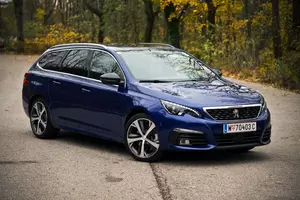
| Vehicle | Precise engine size | Difference from world average | Engine size to consumption ratio | Horsepower from 1 L | Engine size to 100 kg of weight |
|---|---|---|---|---|---|
| 1.2 PureTech |
1.2 L (1199 cc) |
48.9% smaller | 26 cc to 1 mpg | 92 hp from 1 L | - |
| 1.6 BlueHDi |
1.56 L (1560 cc) |
33.5% smaller | 25 cc to 1 mpg | 77 hp from 1 L | 120 cc to 100 kg |
| GT 1.6 THP |
1.6 L (1598 cc) |
31.9% smaller | 39 cc to 1 mpg | 128 hp from 1 L | 123 cc to 100 kg |
| 2.0 BlueHDi |
2 L (1997 cc) |
14.9% smaller | 39 cc to 1 mpg | 89 hp from 1 L | 143 cc to 100 kg |
| GT 2.0 BlueHDi |
2 L (1997 cc) |
14.9% smaller | 39 cc to 1 mpg | 90 hp from 1 L | 143 cc to 100 kg |
| 1.5 BlueHDi |
1.5 L (1499 cc) |
36.1% smaller | - | 87 hp from 1 L | 115 cc to 100 kg |
| 1.6 PureTech |
1.6 L (1598 cc) |
31.9% smaller | 40 cc to 1 mpg | 141 hp from 1 L | - |
| Vehicle | 1.2 PureTech |
|---|---|
| Precise engine size | 1.2 L (1199 cc) |
| Difference from world average | 48.9 smaller |
| Engine size to consumption ratio | 26 cc to 1 mpg |
| Horsepower from 1 L | 92 hp from 1 L |
| Engine size to 100 kg of weight | - |
| Vehicle | 1.6 BlueHDi |
| Precise engine size | 1.56 L (1560 cc) |
| Difference from world average | 33.5 smaller |
| Engine size to consumption ratio | 25 cc to 1 mpg |
| Horsepower from 1 L | 77 hp from 1 L |
| Engine size to 100 kg of weight | 120 cc to 100 kg |
| Vehicle | GT 1.6 THP |
| Precise engine size | 1.6 L (1598 cc) |
| Difference from world average | 31.9 smaller |
| Engine size to consumption ratio | 39 cc to 1 mpg |
| Horsepower from 1 L | 128 hp from 1 L |
| Engine size to 100 kg of weight | 123 cc to 100 kg |
| Vehicle | 2.0 BlueHDi |
| Precise engine size | 2 L (1997 cc) |
| Difference from world average | 14.9 smaller |
| Engine size to consumption ratio | 39 cc to 1 mpg |
| Horsepower from 1 L | 89 hp from 1 L |
| Engine size to 100 kg of weight | 143 cc to 100 kg |
| Vehicle | GT 2.0 BlueHDi |
| Precise engine size | 2 L (1997 cc) |
| Difference from world average | 14.9 smaller |
| Engine size to consumption ratio | 39 cc to 1 mpg |
| Horsepower from 1 L | 90 hp from 1 L |
| Engine size to 100 kg of weight | 143 cc to 100 kg |
| Vehicle | 1.5 BlueHDi |
| Precise engine size | 1.5 L (1499 cc) |
| Difference from world average | 36.1 smaller |
| Engine size to consumption ratio | - |
| Horsepower from 1 L | 87 hp from 1 L |
| Engine size to 100 kg of weight | 115 cc to 100 kg |
| Vehicle | 1.6 PureTech |
| Precise engine size | 1.6 L (1598 cc) |
| Difference from world average | 31.9 smaller |
| Engine size to consumption ratio | 40 cc to 1 mpg |
| Horsepower from 1 L | 141 hp from 1 L |
| Engine size to 100 kg of weight | - |

| Vehicle | Precise engine size | Difference from world average | Engine size to consumption ratio | Horsepower from 1 L | Engine size to 100 kg of weight |
|---|---|---|---|---|---|
| 1.2 PureTech |
1.2 L (1199 cc) |
48.9% smaller | 25 cc to 1 mpg | 108 hp from 1 L | 100 cc to 100 kg |
| 1.6 BlueHDi |
1.56 L (1560 cc) |
33.5% smaller | 23 cc to 1 mpg | 64 hp from 1 L | 111 cc to 100 kg |
| 2.0 BlueHDi |
2 L (1997 cc) |
14.9% smaller | 34 cc to 1 mpg | 75 hp from 1 L | 154 cc to 100 kg |
| GT 1.6 THP |
1.6 L (1598 cc) |
31.9% smaller | 38 cc to 1 mpg | 128 hp from 1 L | 133 cc to 100 kg |
| GT 2.0 BlueHDi |
2 L (1997 cc) |
14.9% smaller | 34 cc to 1 mpg | 90 hp from 1 L | 154 cc to 100 kg |
| GTi 1.6 THP |
1.6 L (1598 cc) |
31.9% smaller | 41 cc to 1 mpg | 156 hp from 1 L | 133 cc to 100 kg |
| 1.6 THP |
1.6 L (1598 cc) |
31.9% smaller | 38 cc to 1 mpg | 98 hp from 1 L | 133 cc to 100 kg |
| 1.2 VTi |
1.2 L (1199 cc) |
48.9% smaller | 26 cc to 1 mpg | 68 hp from 1 L | 109 cc to 100 kg |
| 1.6 e-HDI |
1.56 L (1560 cc) |
33.5% smaller | 24 cc to 1 mpg | 74 hp from 1 L | 130 cc to 100 kg |
| 2.0 e-HDI |
2 L (1997 cc) |
14.9% smaller | 34 cc to 1 mpg | 75 hp from 1 L | 154 cc to 100 kg |
| 1.6 HDI |
1.56 L (1560 cc) |
33.5% smaller | 24 cc to 1 mpg | 59 hp from 1 L | 142 cc to 100 kg |
| Vehicle | 1.2 PureTech |
|---|---|
| Precise engine size | 1.2 L (1199 cc) |
| Difference from world average | 48.9 smaller |
| Engine size to consumption ratio | 25 cc to 1 mpg |
| Horsepower from 1 L | 108 hp from 1 L |
| Engine size to 100 kg of weight | 100 cc to 100 kg |
| Vehicle | 1.6 BlueHDi |
| Precise engine size | 1.56 L (1560 cc) |
| Difference from world average | 33.5 smaller |
| Engine size to consumption ratio | 23 cc to 1 mpg |
| Horsepower from 1 L | 64 hp from 1 L |
| Engine size to 100 kg of weight | 111 cc to 100 kg |
| Vehicle | 2.0 BlueHDi |
| Precise engine size | 2 L (1997 cc) |
| Difference from world average | 14.9 smaller |
| Engine size to consumption ratio | 34 cc to 1 mpg |
| Horsepower from 1 L | 75 hp from 1 L |
| Engine size to 100 kg of weight | 154 cc to 100 kg |
| Vehicle | GT 1.6 THP |
| Precise engine size | 1.6 L (1598 cc) |
| Difference from world average | 31.9 smaller |
| Engine size to consumption ratio | 38 cc to 1 mpg |
| Horsepower from 1 L | 128 hp from 1 L |
| Engine size to 100 kg of weight | 133 cc to 100 kg |
| Vehicle | GT 2.0 BlueHDi |
| Precise engine size | 2 L (1997 cc) |
| Difference from world average | 14.9 smaller |
| Engine size to consumption ratio | 34 cc to 1 mpg |
| Horsepower from 1 L | 90 hp from 1 L |
| Engine size to 100 kg of weight | 154 cc to 100 kg |
| Vehicle | GTi 1.6 THP |
| Precise engine size | 1.6 L (1598 cc) |
| Difference from world average | 31.9 smaller |
| Engine size to consumption ratio | 41 cc to 1 mpg |
| Horsepower from 1 L | 156 hp from 1 L |
| Engine size to 100 kg of weight | 133 cc to 100 kg |
| Vehicle | 1.6 THP |
| Precise engine size | 1.6 L (1598 cc) |
| Difference from world average | 31.9 smaller |
| Engine size to consumption ratio | 38 cc to 1 mpg |
| Horsepower from 1 L | 98 hp from 1 L |
| Engine size to 100 kg of weight | 133 cc to 100 kg |
| Vehicle | 1.2 VTi |
| Precise engine size | 1.2 L (1199 cc) |
| Difference from world average | 48.9 smaller |
| Engine size to consumption ratio | 26 cc to 1 mpg |
| Horsepower from 1 L | 68 hp from 1 L |
| Engine size to 100 kg of weight | 109 cc to 100 kg |
| Vehicle | 1.6 e-HDI |
| Precise engine size | 1.56 L (1560 cc) |
| Difference from world average | 33.5 smaller |
| Engine size to consumption ratio | 24 cc to 1 mpg |
| Horsepower from 1 L | 74 hp from 1 L |
| Engine size to 100 kg of weight | 130 cc to 100 kg |
| Vehicle | 2.0 e-HDI |
| Precise engine size | 2 L (1997 cc) |
| Difference from world average | 14.9 smaller |
| Engine size to consumption ratio | 34 cc to 1 mpg |
| Horsepower from 1 L | 75 hp from 1 L |
| Engine size to 100 kg of weight | 154 cc to 100 kg |
| Vehicle | 1.6 HDI |
| Precise engine size | 1.56 L (1560 cc) |
| Difference from world average | 33.5 smaller |
| Engine size to consumption ratio | 24 cc to 1 mpg |
| Horsepower from 1 L | 59 hp from 1 L |
| Engine size to 100 kg of weight | 142 cc to 100 kg |
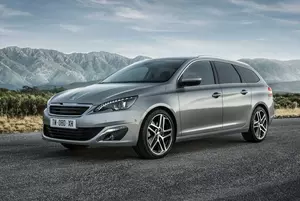
| Vehicle | Precise engine size | Difference from world average | Engine size to consumption ratio | Horsepower from 1 L | Engine size to 100 kg of weight |
|---|---|---|---|---|---|
| 1.2 PureTech |
1.2 L (1199 cc) |
48.9% smaller | 27 cc to 1 mpg | 108 hp from 1 L | 100 cc to 100 kg |
| 1.6 BlueHDi |
1.56 L (1560 cc) |
33.5% smaller | 23 cc to 1 mpg | 64 hp from 1 L | 104 cc to 100 kg |
| 2.0 BlueHDi |
2 L (1997 cc) |
14.9% smaller | 35 cc to 1 mpg | 75 hp from 1 L | 143 cc to 100 kg |
| 1.6 HDi |
1.56 L (1560 cc) |
33.5% smaller | 25 cc to 1 mpg | 59 hp from 1 L | 130 cc to 100 kg |
| GT 1.6 THP |
1.6 L (1598 cc) |
31.9% smaller | 28 cc to 1 mpg | 128 hp from 1 L | 123 cc to 100 kg |
| GT 2.0 BlueHDi |
2 L (1997 cc) |
14.9% smaller | 35 cc to 1 mpg | 90 hp from 1 L | 143 cc to 100 kg |
| 1.6 THP |
1.6 L (1598 cc) |
31.9% smaller | 39 cc to 1 mpg | 97 hp from 1 L | 114 cc to 100 kg |
| 1.6 e-HDi |
1.56 L (1560 cc) |
33.5% smaller | 24 cc to 1 mpg | 74 hp from 1 L | 104 cc to 100 kg |
| Vehicle | 1.2 PureTech |
|---|---|
| Precise engine size | 1.2 L (1199 cc) |
| Difference from world average | 48.9 smaller |
| Engine size to consumption ratio | 27 cc to 1 mpg |
| Horsepower from 1 L | 108 hp from 1 L |
| Engine size to 100 kg of weight | 100 cc to 100 kg |
| Vehicle | 1.6 BlueHDi |
| Precise engine size | 1.56 L (1560 cc) |
| Difference from world average | 33.5 smaller |
| Engine size to consumption ratio | 23 cc to 1 mpg |
| Horsepower from 1 L | 64 hp from 1 L |
| Engine size to 100 kg of weight | 104 cc to 100 kg |
| Vehicle | 2.0 BlueHDi |
| Precise engine size | 2 L (1997 cc) |
| Difference from world average | 14.9 smaller |
| Engine size to consumption ratio | 35 cc to 1 mpg |
| Horsepower from 1 L | 75 hp from 1 L |
| Engine size to 100 kg of weight | 143 cc to 100 kg |
| Vehicle | 1.6 HDi |
| Precise engine size | 1.56 L (1560 cc) |
| Difference from world average | 33.5 smaller |
| Engine size to consumption ratio | 25 cc to 1 mpg |
| Horsepower from 1 L | 59 hp from 1 L |
| Engine size to 100 kg of weight | 130 cc to 100 kg |
| Vehicle | GT 1.6 THP |
| Precise engine size | 1.6 L (1598 cc) |
| Difference from world average | 31.9 smaller |
| Engine size to consumption ratio | 28 cc to 1 mpg |
| Horsepower from 1 L | 128 hp from 1 L |
| Engine size to 100 kg of weight | 123 cc to 100 kg |
| Vehicle | GT 2.0 BlueHDi |
| Precise engine size | 2 L (1997 cc) |
| Difference from world average | 14.9 smaller |
| Engine size to consumption ratio | 35 cc to 1 mpg |
| Horsepower from 1 L | 90 hp from 1 L |
| Engine size to 100 kg of weight | 143 cc to 100 kg |
| Vehicle | 1.6 THP |
| Precise engine size | 1.6 L (1598 cc) |
| Difference from world average | 31.9 smaller |
| Engine size to consumption ratio | 39 cc to 1 mpg |
| Horsepower from 1 L | 97 hp from 1 L |
| Engine size to 100 kg of weight | 114 cc to 100 kg |
| Vehicle | 1.6 e-HDi |
| Precise engine size | 1.56 L (1560 cc) |
| Difference from world average | 33.5 smaller |
| Engine size to consumption ratio | 24 cc to 1 mpg |
| Horsepower from 1 L | 74 hp from 1 L |
| Engine size to 100 kg of weight | 104 cc to 100 kg |
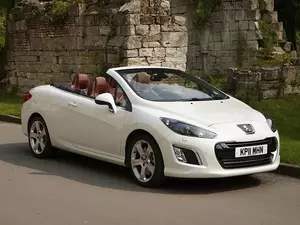
| Vehicle | Precise engine size | Difference from world average | Engine size to consumption ratio | Horsepower from 1 L | Engine size to 100 kg of weight |
|---|---|---|---|---|---|
| 2.0 HDI |
2 L (1997 cc) |
14.9% smaller | 55 cc to 1 mpg | 83 hp from 1 L | 125 cc to 100 kg |
| 1.6 e-HDI |
1.56 L (1560 cc) |
33.5% smaller | 31 cc to 1 mpg | 74 hp from 1 L | 104 cc to 100 kg |
| 1.6I V16 VTi |
1.6 L (1598 cc) |
31.9% smaller | 48 cc to 1 mpg | 75 hp from 1 L | 100 cc to 100 kg |
| 2.0 HDi |
2 L (1997 cc) |
14.9% smaller | 46 cc to 1 mpg | 80 hp from 1 L | 125 cc to 100 kg |
| 1.6 THP |
1.6 L (1598 cc) |
31.9% smaller | 47 cc to 1 mpg | 125 hp from 1 L | 107 cc to 100 kg |
| Vehicle | 2.0 HDI |
|---|---|
| Precise engine size | 2 L (1997 cc) |
| Difference from world average | 14.9 smaller |
| Engine size to consumption ratio | 55 cc to 1 mpg |
| Horsepower from 1 L | 83 hp from 1 L |
| Engine size to 100 kg of weight | 125 cc to 100 kg |
| Vehicle | 1.6 e-HDI |
| Precise engine size | 1.56 L (1560 cc) |
| Difference from world average | 33.5 smaller |
| Engine size to consumption ratio | 31 cc to 1 mpg |
| Horsepower from 1 L | 74 hp from 1 L |
| Engine size to 100 kg of weight | 104 cc to 100 kg |
| Vehicle | 1.6I V16 VTi |
| Precise engine size | 1.6 L (1598 cc) |
| Difference from world average | 31.9 smaller |
| Engine size to consumption ratio | 48 cc to 1 mpg |
| Horsepower from 1 L | 75 hp from 1 L |
| Engine size to 100 kg of weight | 100 cc to 100 kg |
| Vehicle | 2.0 HDi |
| Precise engine size | 2 L (1997 cc) |
| Difference from world average | 14.9 smaller |
| Engine size to consumption ratio | 46 cc to 1 mpg |
| Horsepower from 1 L | 80 hp from 1 L |
| Engine size to 100 kg of weight | 125 cc to 100 kg |
| Vehicle | 1.6 THP |
| Precise engine size | 1.6 L (1598 cc) |
| Difference from world average | 31.9 smaller |
| Engine size to consumption ratio | 47 cc to 1 mpg |
| Horsepower from 1 L | 125 hp from 1 L |
| Engine size to 100 kg of weight | 107 cc to 100 kg |
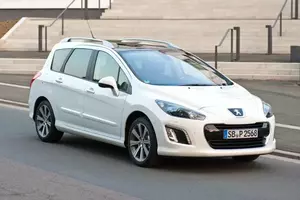
| Vehicle | Precise engine size | Difference from world average | Engine size to consumption ratio | Horsepower from 1 L | Engine size to 100 kg of weight |
|---|---|---|---|---|---|
| 1.4 VTi |
1.4 L (1397 cc) |
40.5% smaller | 38 cc to 1 mpg | 70 hp from 1 L | 100 cc to 100 kg |
| 1.6 VTi |
1.6 L (1598 cc) |
31.9% smaller | 48 cc to 1 mpg | 75 hp from 1 L | 114 cc to 100 kg |
| 1.6 THP |
1.6 L (1598 cc) |
31.9% smaller | 48 cc to 1 mpg | 98 hp from 1 L | 107 cc to 100 kg |
| 1.6 e-HDI |
1.56 L (1560 cc) |
33.5% smaller | 31 cc to 1 mpg | 72 hp from 1 L | 104 cc to 100 kg |
| 1.6 HDI |
1.56 L (1560 cc) |
33.5% smaller | 30 cc to 1 mpg | 59 hp from 1 L | 111 cc to 100 kg |
| 2.0 HDI |
2 L (1997 cc) |
14.9% smaller | 57 cc to 1 mpg | 82 hp from 1 L | 125 cc to 100 kg |
| Vehicle | 1.4 VTi |
|---|---|
| Precise engine size | 1.4 L (1397 cc) |
| Difference from world average | 40.5 smaller |
| Engine size to consumption ratio | 38 cc to 1 mpg |
| Horsepower from 1 L | 70 hp from 1 L |
| Engine size to 100 kg of weight | 100 cc to 100 kg |
| Vehicle | 1.6 VTi |
| Precise engine size | 1.6 L (1598 cc) |
| Difference from world average | 31.9 smaller |
| Engine size to consumption ratio | 48 cc to 1 mpg |
| Horsepower from 1 L | 75 hp from 1 L |
| Engine size to 100 kg of weight | 114 cc to 100 kg |
| Vehicle | 1.6 THP |
| Precise engine size | 1.6 L (1598 cc) |
| Difference from world average | 31.9 smaller |
| Engine size to consumption ratio | 48 cc to 1 mpg |
| Horsepower from 1 L | 98 hp from 1 L |
| Engine size to 100 kg of weight | 107 cc to 100 kg |
| Vehicle | 1.6 e-HDI |
| Precise engine size | 1.56 L (1560 cc) |
| Difference from world average | 33.5 smaller |
| Engine size to consumption ratio | 31 cc to 1 mpg |
| Horsepower from 1 L | 72 hp from 1 L |
| Engine size to 100 kg of weight | 104 cc to 100 kg |
| Vehicle | 1.6 HDI |
| Precise engine size | 1.56 L (1560 cc) |
| Difference from world average | 33.5 smaller |
| Engine size to consumption ratio | 30 cc to 1 mpg |
| Horsepower from 1 L | 59 hp from 1 L |
| Engine size to 100 kg of weight | 111 cc to 100 kg |
| Vehicle | 2.0 HDI |
| Precise engine size | 2 L (1997 cc) |
| Difference from world average | 14.9 smaller |
| Engine size to consumption ratio | 57 cc to 1 mpg |
| Horsepower from 1 L | 82 hp from 1 L |
| Engine size to 100 kg of weight | 125 cc to 100 kg |
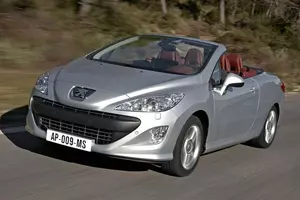
| Vehicle | Precise engine size | Difference from world average | Engine size to consumption ratio | Horsepower from 1 L | Engine size to 100 kg of weight |
|---|---|---|---|---|---|
| 1.6 THP |
1.6 L (1598 cc) |
31.9% smaller | 55 cc to 1 mpg | 88 hp from 1 L | - |
| 1.6I V16 VTi |
1.6 L (1598 cc) |
31.9% smaller | 48 cc to 1 mpg | 75 hp from 1 L | 100 cc to 100 kg |
| 2.0 HDi FAP |
2 L (1997 cc) |
14.9% smaller | 50 cc to 1 mpg | 70 hp from 1 L | 117 cc to 100 kg |
| 1.6 e-HDI |
1.56 L (1560 cc) |
33.5% smaller | 33 cc to 1 mpg | 71 hp from 1 L | 104 cc to 100 kg |
| 2.0 HDI |
2 L (1997 cc) |
14.9% smaller | 55 cc to 1 mpg | 83 hp from 1 L | 125 cc to 100 kg |
| Vehicle | 1.6 THP |
|---|---|
| Precise engine size | 1.6 L (1598 cc) |
| Difference from world average | 31.9 smaller |
| Engine size to consumption ratio | 55 cc to 1 mpg |
| Horsepower from 1 L | 88 hp from 1 L |
| Engine size to 100 kg of weight | - |
| Vehicle | 1.6I V16 VTi |
| Precise engine size | 1.6 L (1598 cc) |
| Difference from world average | 31.9 smaller |
| Engine size to consumption ratio | 48 cc to 1 mpg |
| Horsepower from 1 L | 75 hp from 1 L |
| Engine size to 100 kg of weight | 100 cc to 100 kg |
| Vehicle | 2.0 HDi FAP |
| Precise engine size | 2 L (1997 cc) |
| Difference from world average | 14.9 smaller |
| Engine size to consumption ratio | 50 cc to 1 mpg |
| Horsepower from 1 L | 70 hp from 1 L |
| Engine size to 100 kg of weight | 117 cc to 100 kg |
| Vehicle | 1.6 e-HDI |
| Precise engine size | 1.56 L (1560 cc) |
| Difference from world average | 33.5 smaller |
| Engine size to consumption ratio | 33 cc to 1 mpg |
| Horsepower from 1 L | 71 hp from 1 L |
| Engine size to 100 kg of weight | 104 cc to 100 kg |
| Vehicle | 2.0 HDI |
| Precise engine size | 2 L (1997 cc) |
| Difference from world average | 14.9 smaller |
| Engine size to consumption ratio | 55 cc to 1 mpg |
| Horsepower from 1 L | 83 hp from 1 L |
| Engine size to 100 kg of weight | 125 cc to 100 kg |
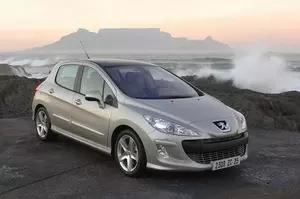
| Vehicle | Precise engine size | Difference from world average | Engine size to consumption ratio | Horsepower from 1 L | Engine size to 100 kg of weight |
|---|---|---|---|---|---|
| 1.4I 16V VTi |
1.4 L (1397 cc) |
40.5% smaller | 39 cc to 1 mpg | 68 hp from 1 L | 107 cc to 100 kg |
| 1.6I 16V THP |
1.6 L (1598 cc) |
31.9% smaller | 48 cc to 1 mpg | 94 hp from 1 L | 114 cc to 100 kg |
| 1.6I 16V THP Auto |
1.6 L (1598 cc) |
31.9% smaller | 53 cc to 1 mpg | 94 hp from 1 L | 114 cc to 100 kg |
| 1.6I 16V VTi Auto |
1.6 L (1598 cc) |
31.9% smaller | 50 cc to 1 mpg | 75 hp from 1 L | 114 cc to 100 kg |
| 1.6I 16V VTi |
1.6 L (1598 cc) |
31.9% smaller | 46 cc to 1 mpg | 75 hp from 1 L | 114 cc to 100 kg |
| 1.6I HDi FAP |
1.56 L (1560 cc) |
33.5% smaller | 31 cc to 1 mpg | 58 hp from 1 L | 111 cc to 100 kg |
| 2.0I HDi FAP |
2 L (1997 cc) |
14.9% smaller | 46 cc to 1 mpg | 68 hp from 1 L | 133 cc to 100 kg |
| 2.0I HDi FAP Auto |
2 L (1997 cc) |
14.9% smaller | 57 cc to 1 mpg | 68 hp from 1 L | 133 cc to 100 kg |
| Vehicle | 1.4I 16V VTi |
|---|---|
| Precise engine size | 1.4 L (1397 cc) |
| Difference from world average | 40.5 smaller |
| Engine size to consumption ratio | 39 cc to 1 mpg |
| Horsepower from 1 L | 68 hp from 1 L |
| Engine size to 100 kg of weight | 107 cc to 100 kg |
| Vehicle | 1.6I 16V THP |
| Precise engine size | 1.6 L (1598 cc) |
| Difference from world average | 31.9 smaller |
| Engine size to consumption ratio | 48 cc to 1 mpg |
| Horsepower from 1 L | 94 hp from 1 L |
| Engine size to 100 kg of weight | 114 cc to 100 kg |
| Vehicle | 1.6I 16V THP Auto |
| Precise engine size | 1.6 L (1598 cc) |
| Difference from world average | 31.9 smaller |
| Engine size to consumption ratio | 53 cc to 1 mpg |
| Horsepower from 1 L | 94 hp from 1 L |
| Engine size to 100 kg of weight | 114 cc to 100 kg |
| Vehicle | 1.6I 16V VTi Auto |
| Precise engine size | 1.6 L (1598 cc) |
| Difference from world average | 31.9 smaller |
| Engine size to consumption ratio | 50 cc to 1 mpg |
| Horsepower from 1 L | 75 hp from 1 L |
| Engine size to 100 kg of weight | 114 cc to 100 kg |
| Vehicle | 1.6I 16V VTi |
| Precise engine size | 1.6 L (1598 cc) |
| Difference from world average | 31.9 smaller |
| Engine size to consumption ratio | 46 cc to 1 mpg |
| Horsepower from 1 L | 75 hp from 1 L |
| Engine size to 100 kg of weight | 114 cc to 100 kg |
| Vehicle | 1.6I HDi FAP |
| Precise engine size | 1.56 L (1560 cc) |
| Difference from world average | 33.5 smaller |
| Engine size to consumption ratio | 31 cc to 1 mpg |
| Horsepower from 1 L | 58 hp from 1 L |
| Engine size to 100 kg of weight | 111 cc to 100 kg |
| Vehicle | 2.0I HDi FAP |
| Precise engine size | 2 L (1997 cc) |
| Difference from world average | 14.9 smaller |
| Engine size to consumption ratio | 46 cc to 1 mpg |
| Horsepower from 1 L | 68 hp from 1 L |
| Engine size to 100 kg of weight | 133 cc to 100 kg |
| Vehicle | 2.0I HDi FAP Auto |
| Precise engine size | 2 L (1997 cc) |
| Difference from world average | 14.9 smaller |
| Engine size to consumption ratio | 57 cc to 1 mpg |
| Horsepower from 1 L | 68 hp from 1 L |
| Engine size to 100 kg of weight | 133 cc to 100 kg |

| Vehicle | Precise engine size | Difference from world average | Engine size to consumption ratio | Horsepower from 1 L | Engine size to 100 kg of weight |
|---|---|---|---|---|---|
| 1.4I 16V VTi |
1.4 L (1397 cc) |
40.5% smaller | - | 68 hp from 1 L | - |
| Vehicle | 1.4I 16V VTi |
|---|---|
| Precise engine size | 1.4 L (1397 cc) |
| Difference from world average | 40.5 smaller |
| Engine size to consumption ratio | - |
| Horsepower from 1 L | 68 hp from 1 L |
| Engine size to 100 kg of weight | - |